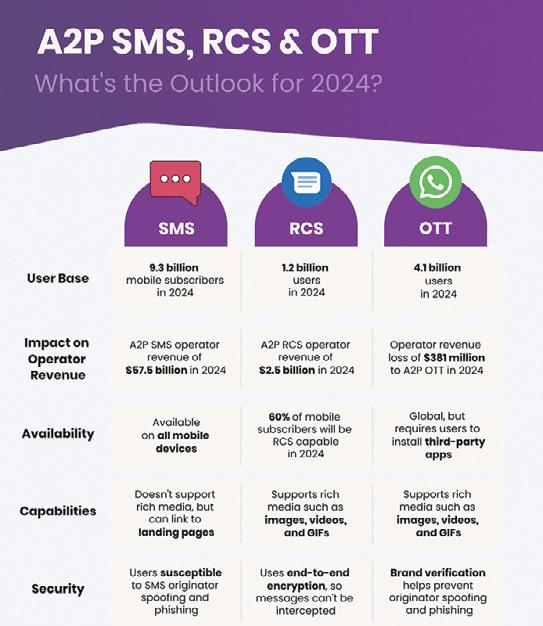
6 minute read
Message Wars
RCS takes on OTT and SMS - and everyone wins
Apple’s embrace of RCS is not only good news for RCS, but elevates the entire rich business messaging market to new heights – it might even also end well for SMS. Paul Skeldon reports
The news, late last year, that the next update of iOS will include support for RCS has ignited the rich business messaging market like nothing before it. Suddenly, rich business messaging – RCS or otherwise – is top of the agenda for those looking to developed interactive, AI-powered, transactional marketing messages. Or even those just wanting to do better customer service.
So, what does the telemedia industry make of the move? Nick Lane, Chief Messaging Officer, Messagologist and Founder, Mobilesquared, says: “It’s surprising and unsurprising in equal measure. Apple was under pressure from higher powers to open up its (i)messaging borders, and Google has been trying to force the interoperability issue with Google Messages/RCS for years. While it means a more consistent messaging experience between Apple iPhone users and Google Android users, the impact this announcement has on business messaging is yet to be understood. The brand and enterprise verification process alone already throws up numerous implications and issues for each party. Regardless, if this is the first, albeit, tentative, step towards a more unified business messaging platform to help drive growth – and brand and enterprise adoption of rich messaging – then it can only be a great thing.”
Rafal Nowak, Business Messaging Director at HORISEN (see page 31), believes that it will exert a profound influence on A2P messaging, reshaping how businesses engage with their customers. According to Nowak, “One compelling argument revolves around the enhanced user experience facilitated by RCS. Traditional SMS lacks the interactive and multimedia capabilities that modern consumers have come to expect from digital communication channels.”
He believes that RCS bridges this gap by offering features such as rich media sharing, suggested replies, and interactive buttons. With Apple’s acceptance of RCS, A2P messaging platforms gain access to these advanced functionalities, enabling businesses to create more immersive and engaging interactions with their customers.
This heightened level of interactivity not only enriches the user experience but also drives higher engagement and response rates for A2P messaging campaigns, he says.
More tellingly, while traditional SMS typically relies on per-message charges or bulk messaging fees, RCS introduces a range of monetisation possibilities, including branded messaging, interactive experiences and enhanced customer support services.
“With Apple’s acceptance of RCS, businesses can leverage these monetization features to generate additional revenue streams and maximize the return on investment from their A2P messaging campaigns,” says Nowak. “Moreover, by offering consumers a more seamless and integrated messaging experience, RCS has the potential to drive higher customer satisfaction and loyalty, further enhancing the value proposition for businesses and incentivizing continued investment in A2P messaging initiatives.”
BOON FOR OPERATORS
Juniper Research’s latest study into the messaging market also points to this expansion of RCS to being a payday for operators. The rich features of RCS, including brand verification, branded messaging, and rich carousels, will allow operators to compete with leading OTT messaging apps through RCS’ improved security and capabilities. This will foster consumer trust to engage in more sophisticated messaging use cases, such as conversational commerce, it says.
The analyst believes that global operator revenue from rich business messaging traffic will grow from $1.3bn in 2023, to $8bn in 2025 – a massive 500% rise. According to its data, operators can expect to earn $57.5bn from A2P
SMS in 2024, $3.5bn from A2P RCS and $381m from A2P OTT messaging (see chart).
Much of this growth will be driven by RCS generating new interest in rich business messaging and that in itself will have an impact on SMS. Research author Gatford notes: “For the first time, the value of SMS is being questioned by enterprises. Operators must act quickly if SMS fraud and high prices cannot be resolved. Apple’s introduction raises the profile of RCS, a technology that has historically been hindered by a lack of support and can become a substitute for SMS business messaging traffic.”
MESSAGING GROWTH
RCS may look like adding competition to existing messaging services such as SMS and WhatsApp, but many in the industry believe that it actually strengthens all business messaging.
Juniper’s research suggests that, despite a fall in OTT messaging’s global market share of conversational commerce spend from 53% in 2024, to 45% in 2028, OTT messaging apps will remain the dominant channel for conversational commerce.
Much of this spend will be driven by the advanced capabilities of OTT messaging apps, says the report, including interactive calls to action and rich media.
These features, it predicts, will enhance the consumer experience; attracting high-spending users to engage in further commerce activity.

OTT messaging apps, being standalone platforms, can move quickly to integrate new technologies, including AI-based personalisation for cross-selling
and upselling opportunities. This will be imperative in highspending industries such as retail, as OTT messaging apps will be deployed as part of an omnichannel marketing strategy alongside messaging channels like RCS.
It is also unlikely to have an immediate impact on SMS. Juniper believes that SMS is set to account for 70% of mobile-based authentication spend by 2025 –despite SMS authentication traffic predicted to only rise 4% next year (see panel).
BRACE FOR IMPACT
However, Fabrizio Salanitri, CEO at HORISEN, believes that RCS is poised to have a notable impact on other messaging channels, particularly WhatsApp.
“[One] significant advantage RCS holds over OTT messaging platforms like WhatsApp is its integration with mobile network operators’ infrastructure, potentially offering enhanced data security and privacy,” he explains. “While WhatsApp encrypts messages end-to-end to protect user privacy, concerns have been raised about its data-sharing
practices with parent company Facebook and its susceptibility to security vulnerabilities.
“In contrast, RCS leverages the existing security measures implemented by mobile operators, such as network-level encryption and secure authentication protocols. This integration with mobile networks could instill greater confidence among users and businesses regarding the security and privacy of their communications.”
Salanitri believes that, as RCS gains traction as a secure messaging channel, businesses may gravitate towards it for sensitive communications, such as financial transactions, personal information exchange, or healthcarerelated interactions. The inherent security features of RCS could position it as a more trustworthy alternative to OTT messaging platforms like WhatsApp, particularly in industries where data security and regulatory compliance are paramount.
Another compelling argument for RCS’s impact on other messaging channels is its native availability on mobile devices. Unlike OTT apps that require users to download and install additional software, RCS is integrated directly into the default messaging app on many Android devices, offering a seamless and familiar user experience. This native integration ensures widespread accessibility to RCS features without the need for third-party apps or additional installations.
“In contrast,” says Salanitri, “platforms like WhatsApp require users to download and install the app separately, potentially creating barriers to entry for users who prefer to use native messaging apps or who are reluctant to install additional software due to storage constraints or privacy concerns. With RCS being pre-installed on many Android devices, users may find it more convenient to use RCS for everyday communication, gradually shifting away from standalone OTT messaging apps like WhatsApp.”










